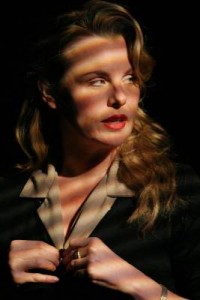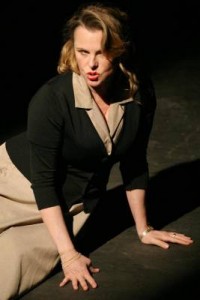
Sylvia Plath is at her desk, facing away, deep in concentration, as the audience
enters the theater. She remains so for perhaps ten minutes until the lights dim, she
turns to us, and it is Angelica Torn whose face we see, and whose voice announces
“This is the last day of my life.” For the next two hours plus, we are reminded again
and again that today, February 11, 1963, is the day that Sylvia Plath will take her
own life.
Before seeing Edge, the one-woman Sylvia Plath bio-play which Paul Alexander
wrote with Torn in mind, my knowledge of Plath was minimal. I knew that a) she was
a poet, b) she was depressed, c) she wrote The Bell Jar, and d) she stuck her head in
an oven and killed herself.
Edge filled in the gaps.
Plath grew up in comfortable 30s and 40s New England. Her professor father died of
diabetes because he refused to consult a doctor, certain that he had cancer and
that nothing could be done about it. While still a student at Smith College, Plath
worked briefly as guest editor for Mademoiselle magazine and began to experience
depression. She attempted suicide three times before her final, successful try.
Though she detested her father, she ended up “marrying him” in the person of English
poet Ted Hughes. Edge contends that Hughes’ talent was secondary to Plath’s,
though he reaped millions from her work after her death and was British poet
laureate until his death. (Hughes’ estate would most certainly dispute the negative
light Edge places him in, and therefore, not surprisingly, none of Plath’s poetry is
quoted in Alexander’s play.)
No matter. Edge exists primarily as a vehicle for Torn, for whom any audience’s
expectations are sure to be high, being the daughter of acting legends Geraldine
Page and Rip Torn. In a performance for which terms like “tour de force” and “force
of nature” seem to have been invented, Torn does not disappoint, commanding our
attention from the moment we set eyes on her and holding it through the play’s gut-
wrenching climax.
Torn’s performance is a theatrical one, to say the least. Audience members would
be hard pressed to count how many “notes” she hits as she moves through Plath’s
tortured life. If any performance can be described as “multilayered,” it is Torn’s. At
one moment she talks bitterly about how Plath “gave everything to him (Hughes),
her body, her mind, her undying love only to have it all destroyed to crushing
disappointment,” and a split second later she tells us with more than a trace of irony,
“Not that I’m bitter.” This is clearly a woman who knows how to use sarcasm as a
weapon.
My theater guest at Sunday’s performance found Torn’s performance to be
“actresssy.” My own take on her admittedly mannered performance (e.g. periods
frequently disappear between sentences) is that it is Plath herself who is doing the
“acting” and not Torn. Despite my not having heard the real Sylvia Plath speak, this
theatrical delivery would seem to be in line with a woman for whom daily life was
“drama.” There are mood swings galore, from joy to self-deprecation to cynicism to
despair, and plenty of black humor. This is a performance that truly runs the gamut
from A to Z and back again, yet even at her most vulnerable, Torn is a commanding
presence on the stage. There is a particularly powerful scene between Plath and
her psychiatrist in which Torn, playing both roles, moves effortlessly back and forth
from a despondent Plath to her controlled, businesslike therapist. This is the kind of
performance for which award nominations are, as they say, a sure thing.
Any one-person show must certainly be a collaborative effort between actor and
director, and as Alexander is both director and playwright, he shares credit for Torn’s
bravura work.
William St. John designed both Edge’s set and lighting. While the former is simple in
the extreme, consisting of furniture on a bare black stage, the latter is exquisitely
complex, with a different effect for each of the locations Plath travels to in Edge’s
journey: a hotel room, a grassy field, a graveyard, a basement, a psychiatrist’s office,
a séance, a window overlooking a street, and finally the oven which was to bring
about Plath’s death. (Sunday’s performance was accompanied by heavy rains on
the roof of the Odyssey theater, which could just as easily have been part of a
deliberate sound design.)
Ultimately, the success or failure of a one-actor play rests on the shoulders of the
performer who undertakes the daunting challenge of commanding an audience’s
attention for the length of the play. Though Plath scholars (and Ted Hughes’ heirs)
might quibble about the accuracy of Edge’s depiction of Mr. Hughes, few would
argue that Angelica Torn’s performance is anything less than riveting.
Odyssey Theatre Ensemble, 2055 South Sepulveda Boulevard, Los Angeles.
www.odysseytheatre.com
–Steven Stanley
January 6, 2008
Photos: Enci




 Since 2007, Steven Stanley's StageSceneLA.com has spotlighted the best in Southern California theater via reviews, interviews, and its annual StageSceneLA Scenies.
Since 2007, Steven Stanley's StageSceneLA.com has spotlighted the best in Southern California theater via reviews, interviews, and its annual StageSceneLA Scenies.







 COPYRIGHT 2024 STEVEN STANLEY :: DESIGN BY
COPYRIGHT 2024 STEVEN STANLEY :: DESIGN BY